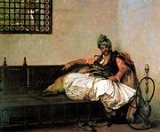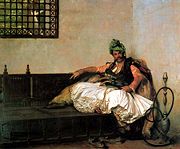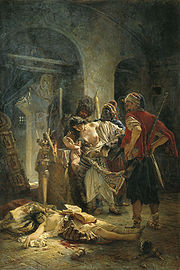
Bashi-bazouk
Encyclopedia

Turkish language
Turkish is a language spoken as a native language by over 83 million people worldwide, making it the most commonly spoken of the Turkic languages. Its speakers are located predominantly in Turkey and Northern Cyprus with smaller groups in Iraq, Greece, Bulgaria, the Republic of Macedonia, Kosovo,...
başıbozuk, or delibaş, literally "damaged head", meaning "free headed", "leaderless", "disorderly") was an irregular
Irregular military
Irregular military refers to any non-standard military. Being defined by exclusion, there is significant variance in what comes under the term. It can refer to the type of military organization, or to the type of tactics used....
soldier of the Ottoman
Ottoman Empire
The Ottoman EmpireIt was usually referred to as the "Ottoman Empire", the "Turkish Empire", the "Ottoman Caliphate" or more commonly "Turkey" by its contemporaries...
army. Particularly noted for their lack of discipline.
Irregulars

The Ottoman army consisted of:
- The Sultan's household troops, called Kapıkulu, which were salaried, most notable being janissaryJanissaryThe Janissaries were infantry units that formed the Ottoman sultan's household troops and bodyguards...
corps. - Provincial soldiers, which were fiefed (Turkish TımarlıTimariotA timariot was another name given to the Timarli Sipahi cavalry that served the Ottoman sultan and in return was granted a fief called a timar. The timariots had to assemble with the army when at war, and had to take care of the land entrusted to him in times of peace...
), the most important being Timarli SipahiSipahiSipahi was the name of several Ottoman cavalry corps...
(lit. "fiefed cavalry") and their retainers (called cebelu lit. armed, man-at-arms), but other kinds were also present. - Soldiers of subject, protectorate, or allied states (the most important being the CrimeaCrimeaCrimea , or the Autonomous Republic of Crimea , is a sub-national unit, an autonomous republic, of Ukraine. It is located on the northern coast of the Black Sea, occupying a peninsula of the same name...
n Khans) - Bashi-bazouk usually did not receive regular salaries, and lived off loot.
Recruitment

Commander-in-Chief
A commander-in-chief is the commander of a nation's military forces or significant element of those forces. In the latter case, the force element may be defined as those forces within a particular region or those forces which are associated by function. As a practical term it refers to the military...
would be able to muster hundreds of thousands of soldiers and lead an excursion into Austria or Iran, whichever posed the greatest threat, capturing or extorting sufficient lands or money to cover the expenses of the next campaign in the process. Frequently, the actual number of soldiers deployed to the battlefield was one order of magnitude less. On the eve of battle an Ottoman commander would tap any source of manpower he saw fit; hiring mercenaries was one of them. The hiring process occurred in an open market, with prices determined by negotiation between the mercenary troop leader and an Ottoman commander. Prices were affected by the quality and quantity of mercenary troop available as well as the commander's requirements. Oral negotiations usually led to a written contract
Contract
A contract is an agreement entered into by two parties or more with the intention of creating a legal obligation, which may have elements in writing. Contracts can be made orally. The remedy for breach of contract can be "damages" or compensation of money. In equity, the remedy can be specific...
. Some of these documents survive today, often showing small mercenary leaders contracting for very high amounts.
History
An attempt by Husrev Pasha to disband his Albanian bashi-bazouks in favor of his regular forces began the riotingMuhammad Ali's seizure of power
The process of Muhammad Ali's seizure of power in Egypt was a long three way civil war between the Ottoman Turks, Egyptian Mamluks, and Albanian mercenaries. It ended in victory for the Albanians led by Muhammad Ali of Egypt ....
which led to the establishment of Muhammad Ali
Muhammad Ali of Egypt
Muhammad Ali Pasha al-Mas'ud ibn Agha was a commander in the Ottoman army, who became Wāli, and self-declared Khedive of Egypt and Sudan...
's Khedivate of Egypt
Khedivate of Egypt
The Khedivate of Egypt was an autonomous tributary state of the Ottoman Empire.- Rise of Muhammad Ali :The Egypt Eyalet was an eyalet of the Ottoman Empire. The eyalet was ruled locally by the Mamluk military caste and their various beys , who started to fight amongst themselves for control of...
.
Reputation
The bashi-bazouk were notorious for being brutal and undisciplined, thus giving the term its second, colloquial meaning of "undisciplined bandit" in many languages. A notable example of this use is in the comic series TintinThe Adventures of Tintin
The Adventures of Tintin is a series of classic comic books created by Belgian artist , who wrote under the pen name of Hergé...
, where the word is often used as an expletive by Captain Haddock
Captain Haddock
Captain Archibald Haddock is a fictional character in The Adventures of Tintin, the series of classic Belgian comic books written and illustrated by Hergé...
.
Their use was abandoned by the end of the 19th century. However, self-organized bashi-bazouk troops still appeared later.
The term "bashibozouk" has also been used for a mounted force, existing in peacetime in various provinces of the Ottoman empire, which performed the duties of gendarmerie
Gendarmerie
A gendarmerie or gendarmery is a military force charged with police duties among civilian populations. Members of such a force are typically called "gendarmes". The Shorter Oxford English Dictionary describes a gendarme as "a soldier who is employed on police duties" and a "gendarmery, -erie" as...
.
Further reading
- Ottoman warfare, 1500-1700 by Rhoads Murphey. London : UCL Press, 1999.
- Özhan ÖztürkÖzhan ÖztürkÖzhan Öztürk is a Turkish writer and researcher. He was a writer for the first Turkish Folklore Encyclopaedia and first encyclopaedic dictionary of the culture, folklore of the peoples Black Sea region of Turkey.- Works :...
(2005). Karadeniz (Black SeaBlack SeaThe Black Sea is bounded by Europe, Anatolia and the Caucasus and is ultimately connected to the Atlantic Ocean via the Mediterranean and the Aegean seas and various straits. The Bosphorus strait connects it to the Sea of Marmara, and the strait of the Dardanelles connects that sea to the Aegean...
): Ansiklopedik Sözlük. 2 Cilt. Heyamola Yayıncılık. İstanbul. ISBN 975-6121-00-9.

